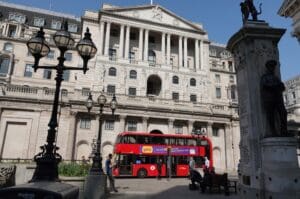Britain’s benchmark borrowing costs have soared to their highest level since the financial crisis, as investors offload government debt amid persistent inflation fears.
The yield on the UK’s 10-year gilt — closely watched as a barometer of future interest payments on public borrowing — reached 4.82 per cent on Wednesday, surpassing the peaks seen in the immediate aftermath of Liz Truss’s 2022 mini-budget.
Yields on the 30-year gilt, which took centre stage during that market turmoil two and a half years ago, climbed to 5.358 per cent on Tuesday — a fresh 27-year high. Bond yields rise as prices fall, underscoring the extent of this latest sell-off.
The pound also weakened, slipping by 1 per cent against the dollar to $1.23 and underperforming many of its peers — a signal that markets remain sceptical about the UK’s fiscal sustainability.
Investors’ enthusiasm for the dollar has continued to build over expectations of corporate tax cuts and regulatory rollbacks under the new US administration. The dollar index, tracking the greenback against six other major currencies, rose by 0.46 per cent on Wednesday and has increased by almost 7 per cent in the past year. Oil prices dipped by more than 1 per cent, bucking the broader inflation trend.
Commentators say multiple factors have made the UK particularly vulnerable to a rise in gilt yields. Britain’s reliance on energy imports has amplified commodity price shocks, while traders — seeing more attractive returns on investment-grade private debt — are demanding a higher premium on UK government bonds. Additional borrowing revealed in October’s budget, combined with the Bank of England’s gradual interest rate cuts this year, have also weighed on gilt prices.
Simon French, chief economist at Panmure Liberum and a Times columnist, noted that “the decoupling of UK long bond yields from their most relevant international benchmark — US long bonds — took place in 2022 [after the mini-budget] and has never really reverted.”
A toxic combination of weakening sterling and rising yields was last observed during Liz Truss’s mini-budget fallout, when markets heavily questioned Britain’s fiscal resilience.
The latest spike in borrowing costs directly impacts government finances by driving up debt servicing costs, eroding the chancellor’s spending headroom. A report by Capital Economics estimates that £8.9 billion of Rachel Reeves’s £9.9 billion fiscal buffer has already been eaten away, raising the likelihood of further tax rises or public spending cuts.
Unless gilt yields settle lower by March, when the Office for Budget Responsibility (OBR) updates its forecasts, Reeves could be forced to rein in Whitehall budgets to balance the government’s books. A Treasury spokesperson reiterated that meeting fiscal rules is “non-negotiable,” although the chancellor has pledged there will be no tax changes at her spring statement on 26 March. That leaves spending cuts as the most probable option if borrowing costs remain elevated.
Jim Reid, an analyst at Deutsche Bank, said the government may be pushed towards further tax hikes if yields stay high, while acknowledging that such moves would face political resistance.
Reeves has already pencilled in a 4.3 per cent increase in departmental expenditure this year and 2.6 per cent for 2025-26. Beyond that, budgets are set to rise by only 1.3 per cent. Any shake-up in spending allocations could alter the upcoming spending review in June.
A Treasury spokesperson said it would not “pre-empt” the OBR’s figures, but emphasised that “no one should be under any doubt of the chancellor’s commitment to economic stability and sound public finances.”
Gilts have been the worst-performing major asset class this week, echoing global bond market jitters in the US, Germany, and France. Yields surged late on Tuesday following data pointing to continued inflationary pressures in the US, driving its 10-year Treasury yields to levels not seen since April 2024. Benjamin Schroeder, senior rates strategist at ING, noted that “bearish US sentiment has strong spillovers to the gilts market.”
The pound has suffered as investors gravitate towards the dollar, which has benefited from uncertainty around Donald Trump’s trade policy, including provocations about the Panama Canal and Greenland. Markets now expect fewer rate cuts from the Federal Reserve and the Bank of England alike, a scenario that often boosts currencies. However, sterling has failed to follow suit, reflecting the gravity of the UK’s fiscal and inflationary challenges.
Kenneth Broux, currency strategist at Société Générale, warned that market conditions are “primed for a bond tantrum,” with ever-rising supply and unpredictable policies as 2025 unfolds. The concern in Whitehall is that such turbulence could persist, placing Britain’s public finances — and the chancellor’s political position — in an increasingly precarious spot.
Read more:
UK government debt sell-off accelerates as borrowing costs reach post-2008 peak















